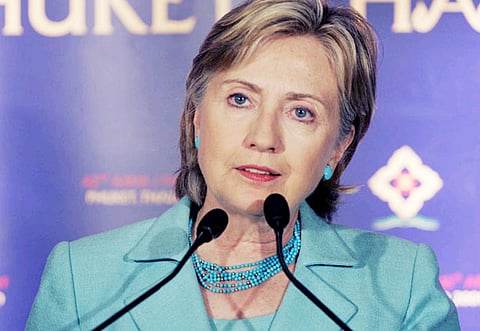Arab masses will not be fooled
Khalifa Rashid Al Sha'ali writes: Western countries should reconsider their approach of interfering in region's domestic affairs

The Arab people overlooked the mistakes and misdoings of their rulers in the past; their silence seen by some as a sign of the respect that children are taught to show their elders.
Recent events have proved that people have certain limits when it comes to respecting their rulers, especially after some regimes lost their self-respect. These regimes have also lost the respect of ‘the other', which supported and backed them in sabotaging the interests of their own people as long as the regime served its interests as a price for staying in power.
It's no secret that security agencies and strategic observers are apprehensive about the state of rapprochement between the Arab people and Islamist organisations as well as about the people's acceptance of their views and ideologies without fear of what is rumoured about these groups.
This prompted a large number of people, who were once supporters of such regimes, to join these organisations. Maybe this is because of the conviction in the ability of these organisations to meet the expectations of the people, and their dreams of freedom, dignity and a comfortable life.
Some regimes have sided with the traditional enemy of the Arabs' values and principles in the past, present and future. By doing so, these regimes have left no choice for the ordinary citizen but to support anyone who stands up to the US, Israel and their allies.
This has created frustration in the Arab world, which is also grappling with serious problems including poverty, destitution, unemployment and denial of basic rights such as freedom of expression and political participation.
Some ruling regimes were seen for what they are, after they removed the masks that hide their vile deeds and disgraceful acts, ignoring what people say at home and abroad.
Some of these regimes were betting for decades on the US and Israel, believing that their survival only depended on these two countries — the winning horses — and what America and Israel want would inevitably happen.
Such regimes believed that there was no need to seek legitimacy from their people, as long as the CIA kept them in power. Hence, there was no choice for the people except to revolt and demand the downfall of such regimes.
The average Arab citizen in some countries is no longer proud of his leadership.
With the world suffering from the effects of the economic crisis and the US withdrawal from the peace process in the Middle East, it seems that all the cards are now in the hands of Israel, which was a strategic ally of some Arab regimes.
Obviously, the US is preoccupied with domestic economic, social and political affairs as this is the only way that President Barack Obama can win a second term in office.
It seems that the CIA is no longer able to do anything in the face of the dynamic movement of the smart Arab masses, and the collective Arab opinion is no longer afraid of the influence of the CIA. The Arab masses are also no longer afraid of Islamic organisations ruling or sharing power.
Greater awareness
This is simply because the Arab citizens have become more aware and are able to understand the political game.
With popular uprisings across the Arab world, it has become obvious that the US administration is not betting on the losing horses in the region — something that was expected from this administration. However, this is an attempt by the US to thwart the revolutions of Tunisia and Egypt and other reform movements — a fact that was clearly demonstrated by US Secretary of State Hillary Clinton.
"No regime is immune from change," Clinton said in her comments on Arab revolutions.
The attempt by the US and other powers to ride the wave of revolutions and cheat the people is not new. It is the tradition of these powers when they fail to change a repressive regime.
The US and other western countries must reconsider their approach towards Arab regimes as the Arab people will no longer accept American involvement in their domestic affairs under the banner of ‘moderation' and democratic values or fighting religious fundamentalism.
The Arab people will no longer be deluded by the excessively used slogans and promises of democracy. The case of the ousted Tunisian president Zine Al Abidine Bin Ali stands as an example of the US policy in the Middle East.
This has always been the US policy in the Arab region when it had no role in regime change. Washington tried to thwart the 1952 revolution of the Free Officers in Egypt, when the US president called for an end to the France-UK-Israel aggression against Egypt in 1956.
Today, the failure by some regimes in dealing with their people's needs and demands provides clear evidence of how out of touch these regimes are with their people.
The lesson to be learnt by Arab regimes is that the attempts to satisfy people by giving them what they want little by little will not work because the people have set the ceiling of their demands, and are ready to pay dearly.
The only successful political project is reconciliation between these regimes and their own people. This is the only guarantor of security and stability.
Dr Khalifa Rashid Al Sha'ali is an Emirati writer who specialises in legal affairs.


